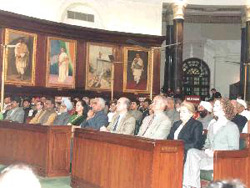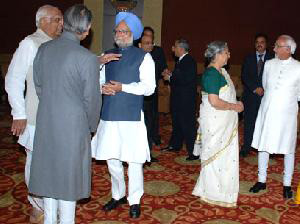Archived_Member16
SPNer
PM invokes Sikh Guru's battle cry while moving trust motion
NEW DELHI, JULY 21 (PTI) :
A Sikh guru's battle cry was today invoked by Prime Minister Manmohan Singh to affirm that he would not be deterred from the path of "good work", as he sought a vote of confidence in the Lok Sabha today.
"Deh siva var mohe, shubh karman te kabhu na darru. Na daru arso jab jaye ladoo, nischey kar apni jeet karun
"Ar sikh hoon, apne he man so, ehi lalch ho, gun ton uchroon. Jab aav ki oodh nidhan bane, at hi run main tab joojh maroon," Singh said reciting a verse of Guru Gobind Singh at the end of his speech moving the motion. (Oh God almighty, give me strength that nothing could deter me from the path of good work. And when I go to the battlefield I must emerge the winner. Give me strength so that I don't get distracted. I should be the winner even if I have to loose my life.)
---------------------------------------------------------------------------------------------------
HINDUSTAN TIMES
Indo-Asian News Service
New Delhi, July 21, 2008
Trust motion was fully avoidable, says Manmohan
Prime Minister Manmohan Singh sought the confidence of the Lok Sabha on Monday and said the trust vote was avoidable as he had promised to return to the Parliament before operationalising the contentious nuclear deal with Washington.
“It (trust motion) was fully avoidable," Manmohan Singh said as he moved the one-line motion seeking the trust of parliament for his government -- reduced to minority after the Communist Party of India-Marxist (CPI-M)-led Left parties withdrew their legislative support in protest against the government’s move to carry the India-US civil nuclear deal forward.
"I have repeatedly assured all, including the Left parties, that I myself would come to the guidance of parliament before operationalising the nuclear deal, if we were allowed to go to the IAEA (International Atomic Energy Agency) to finalise the India-specific safeguards agreement),” said Manmohan Singh.
He said he regretted that the government had to seek a trust vote at a time its attention was on the economy, especially on controlling inflation and "implementing the welfare programmes for the people, particularly the farmers".
Interestingly, the prime minister was not expected to speak after moving the trust motion. According to his personal aides, Manmohan Singh, who arrived at his parliament house office at around 10.30 a.m., wrote the brief speech himself.
The prime minister reiterated that he and his government had taken all the decisions in the best interests of the Indian people.
"I assure the house and the country that every single decision, every policy decision was taken in the fullest confidence that it was in the best interest of the people of the country.”
After moving the motion - “that this house expresses its confidence in the council of ministers" - Manmohan Singh reminded the house that unlike his predecessors it was for the first time his United Progressive Alliance (UPA) government that had completed four years and two months in office was facing a trust vote.
In what is being seen as a snipe at the CPI-M’s present leadership, especially its general secretary Prakash Karat, Manmohan Singh praised the "sagacity, wisdom and visionary leadership" of communist veterans Jyoti Basu and Harkishan Singh Surjeet who he said were the architects of the coalition government.
The prime minister also cited Guru Gobind Singh for showing his determination to go ahead without being scared of the repercussions.
In an uncharacteristic intervention, Manmohan Singh countered Leader of Opposition L.K. Advani’s criticism over his stance on the nuclear tests of 1998.
“The leader of opposition has said that in 1998 I had opposed the test and that I was arguing for nuclear proliferation during my speech in the Rajya Sabha. Let an objective person read the test of my speech and conclude …,” he said, while intervening during Advani's speech.
He added he had made his comments on the nuclear tests in the context of non-proliferation goals that India had put forward in the UN in 1988.
“We all were opposed to the sanctions (imposed on India after the Pokharan test). What I said was that we must prepare our country to face the sanctions.”
http://www.hindustantimes.com/storypage/Print.aspx?Id=7482e1b2-50fa-4ff3-9bbc-8379ade7a81a
© Copyright 2007 Hindustan Times
NEW DELHI, JULY 21 (PTI) :
A Sikh guru's battle cry was today invoked by Prime Minister Manmohan Singh to affirm that he would not be deterred from the path of "good work", as he sought a vote of confidence in the Lok Sabha today.
"Deh siva var mohe, shubh karman te kabhu na darru. Na daru arso jab jaye ladoo, nischey kar apni jeet karun
"Ar sikh hoon, apne he man so, ehi lalch ho, gun ton uchroon. Jab aav ki oodh nidhan bane, at hi run main tab joojh maroon," Singh said reciting a verse of Guru Gobind Singh at the end of his speech moving the motion. (Oh God almighty, give me strength that nothing could deter me from the path of good work. And when I go to the battlefield I must emerge the winner. Give me strength so that I don't get distracted. I should be the winner even if I have to loose my life.)
---------------------------------------------------------------------------------------------------
HINDUSTAN TIMES
Indo-Asian News Service
New Delhi, July 21, 2008
Trust motion was fully avoidable, says Manmohan
Prime Minister Manmohan Singh sought the confidence of the Lok Sabha on Monday and said the trust vote was avoidable as he had promised to return to the Parliament before operationalising the contentious nuclear deal with Washington.
“It (trust motion) was fully avoidable," Manmohan Singh said as he moved the one-line motion seeking the trust of parliament for his government -- reduced to minority after the Communist Party of India-Marxist (CPI-M)-led Left parties withdrew their legislative support in protest against the government’s move to carry the India-US civil nuclear deal forward.
"I have repeatedly assured all, including the Left parties, that I myself would come to the guidance of parliament before operationalising the nuclear deal, if we were allowed to go to the IAEA (International Atomic Energy Agency) to finalise the India-specific safeguards agreement),” said Manmohan Singh.
He said he regretted that the government had to seek a trust vote at a time its attention was on the economy, especially on controlling inflation and "implementing the welfare programmes for the people, particularly the farmers".
Interestingly, the prime minister was not expected to speak after moving the trust motion. According to his personal aides, Manmohan Singh, who arrived at his parliament house office at around 10.30 a.m., wrote the brief speech himself.
The prime minister reiterated that he and his government had taken all the decisions in the best interests of the Indian people.
"I assure the house and the country that every single decision, every policy decision was taken in the fullest confidence that it was in the best interest of the people of the country.”
After moving the motion - “that this house expresses its confidence in the council of ministers" - Manmohan Singh reminded the house that unlike his predecessors it was for the first time his United Progressive Alliance (UPA) government that had completed four years and two months in office was facing a trust vote.
In what is being seen as a snipe at the CPI-M’s present leadership, especially its general secretary Prakash Karat, Manmohan Singh praised the "sagacity, wisdom and visionary leadership" of communist veterans Jyoti Basu and Harkishan Singh Surjeet who he said were the architects of the coalition government.
The prime minister also cited Guru Gobind Singh for showing his determination to go ahead without being scared of the repercussions.
In an uncharacteristic intervention, Manmohan Singh countered Leader of Opposition L.K. Advani’s criticism over his stance on the nuclear tests of 1998.
“The leader of opposition has said that in 1998 I had opposed the test and that I was arguing for nuclear proliferation during my speech in the Rajya Sabha. Let an objective person read the test of my speech and conclude …,” he said, while intervening during Advani's speech.
He added he had made his comments on the nuclear tests in the context of non-proliferation goals that India had put forward in the UN in 1988.
“We all were opposed to the sanctions (imposed on India after the Pokharan test). What I said was that we must prepare our country to face the sanctions.”
http://www.hindustantimes.com/storypage/Print.aspx?Id=7482e1b2-50fa-4ff3-9bbc-8379ade7a81a
© Copyright 2007 Hindustan Times




 !!!!!!!
!!!!!!!


